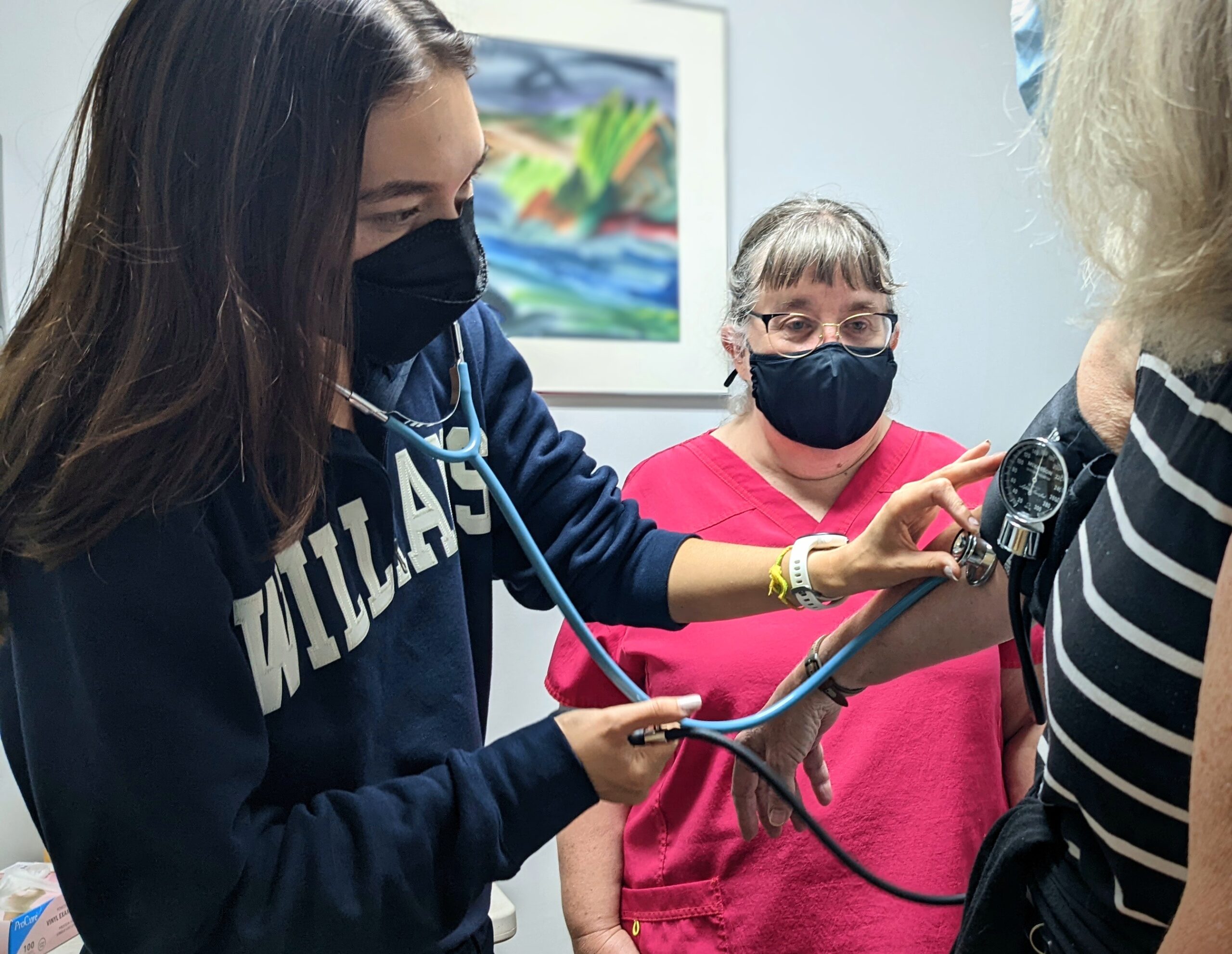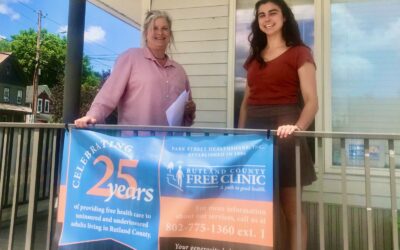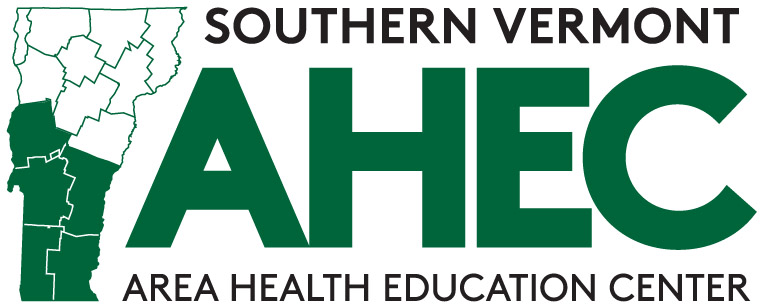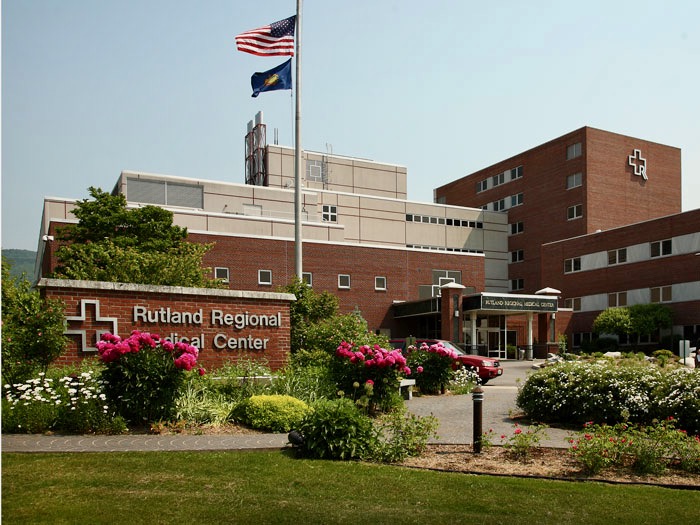CSHIP 2022
Southern Vermont AHEC’s College Student Internship Program (CSHIP) is in full swing. This summer we have matched a number of students interested in health careers with paid internships with organizations focused on rural and public health. We’d like to highlight Sarah Abbott, a Bates College graduate, who is currently doing her CSHIP program with RCFC – Rutland County Free Clinic.
What is CSHIP?
C-SHIP is an Internship program for students enrolled in post-secondary education with intent to pursue a career in health care.

What Our Interns are Saying
Here is what Sarah has taken away from her experience so far; “Being at the Rutland County Free Clinic has taught me the foundation of how the healthcare system works and how rural and public health systems interconnect. I have had the opportunity to meet and build relationships with many community partners, identifying areas of need, and helping to address them like putting together Emergency First Aid Medical and Dental Kits. Everyday I am working on something different, and I love it.”

Are you interested in CSHIP?

Susan White
If you’re interested in learning more about the program contact Susan White, Director of Health Careers Preparation & Practitioner Support at swhite@svtahec.org
Download our CSHIP brochure here: PDF FILE
Internships are paid, 100 hours, most are remote, project based, and are typically completed over a summer. These are non-clinical internships.
Placements are made with organizations and agencies with which we have partnerships, including hospitals, clinics, emergency medical providers, eldercare settings, public health agencies, primary prevention coalitions, mental health and substance misuse providers, and other healthcare related fields.
Positions are competitive and currently are located in Addison, Bennington, Rutland, Windsor and Windham counties.
SVTAHEC has recruited and placed over 70 students in healthcare-related internships since 2013.
- Alumni have either gone on to health science-related graduate or medical school, or been hired by healthcare providers.
- CSHIP engages students with organizations or agencies that look to improve rural healthcare, drawing on resources and professionals throughout the community
We’re With You Every Step of The Way
Everything you need to know about C-SHIP.

Applications

Timeline

Curriculum

FAQ

Resources
Application Process
Interns must currently be enrolled in either a degree program at an institution of higher education or engaged in a certification program which leads to a health-related profession.
While interns must be intent on exploring a career in medical, mental/behavioral, oral, or public health, we welcome students in all fields of study.
More Info
To apply for an internship in southern Vermont (Addison, Bennington, Rutland, Windham and Windsor Counties) please send the following:
- A cover letter stating your interest in the program and how it relates to your academic interests and career goals
- Your Resume
Once we have reviewed your application and believe that you may be a good fit for our program, we will request a letter of recommendation from an academic contact (professor, mentor, etc.) who is knowledgeable about your academic performance and career goals
The suggested deadline for submitting an application for a summer internship is March 30.
Materials should be addressed to Susan White, SVTAHEC Education Resource Coordinator, at swhite@svtahec.org
C-SHIP Yearly Timeline
View Timeline
Oct – Nov – Start thinking about next Summer Internship Options
Dec – Feb – Student Application information available online
Mar – Apr – Interviews in person, by attending college career fairs, and by phone. Deadline – Late March
April – Selections made as student information is provided to organizations
May – Placements confirmed
June– Orientation and Internships start
July-August: Internships underway
August: Most internships will have been completed.
C-SHIP Core Curriculum
While student interns work for an organization on a project integral to their own field of study, they also learn career-readiness skills and foundational knowledge about rural health care.
More Info
Career Readiness Training
- Students select two Career Readiness Competencies to develop and practice as part of their internship experience. Career Readiness skills include:
- Critical Thinking/Problem Solving
- Professionalism/Work Ethic
- Teamwork/Collaboration
- Oral and Written Communications
- Leadership
- Working with Digital Technology
- Career Management
- Global/Intercultural Fluency
NACE Career Readiness Infographic click here: PDF
For information on the Association of American Medical Schools (AAMC) 15 Core Competencies for medical school applicants click here: https://students-residents.aamc.org/applying-medical-school/article/med-schools-looking-for-15-competencies/
For more information on career readiness competencies visit our Career Readiness Resource Page here: link to Student Tab-Career Readiness Resources
Delivering Rural Health Care in Vermont
- Students learn about the 6 Area Health Education Center (AHEC) topic areas related to emerging concepts and systems which define the delivery of rural health care in Vermont. They demonstrate their mastery of at least 2-3 as they relate to their internship experience. Topic areas include:
- Behavioral Health Integration
- Team-based Approach to Health Care
- Social Determinants of Health
- Delivering Care with Cultural Sensitivity
- Practice Transformation through Quality Improvement Measures
- Current and Emerging Health Issues
For more information of the AHEC Core Topic areas see https://www.nationalahec.org/index.php/scholars-core-topics
Career Readiness Resources for Students
More Info
Career Readiness Resources (Health-Related)
The Association of American Medical Colleges has developed 15 core competencies for students entering medical students:
https://www.aamc.org/services/admissions-lifecycle/competencies-entering-medical-students
College Career Offices
SVTAHEC works with college and university career offices in marketing its C-SHIP program. We urge undergraduates to avail themselves of the excellent career resources they have at their own institution.
Orientation
Interns receive training and orientation from the organization with which they are matched. Interns may also take part in a half-day orientation event held at the beginning of the summer. The orientation introduces the interns to the core curriculum, answers any questions that they might have about the program, and provides an opportunity to meet fellow interns.
FAQ for Students
More Info
Where are these internships?
Sites are located in Addison, Bennington, Rutland, Windsor and Windham counties.
How do I apply?
Please send your resume, and a cover letter indicating your interest and availability to swhite@svtahec.org Susan P White at SVTAHEC. We will also request a letter of reference when your eligibility is confirmed.
Do I get paid?
Yes! C-SHIP internships are paid $15.00/hour.
How long is an internship?
Internships are up to 100 hours.
Can I work alongside a Doctor in a hospital?
Not likely. These are non-clinical internships, and most are with a nonprofit, public health or social service agencies involved in health care in some way. Rarely can we place a student in a hospital setting. If you have certification such as EMT or LNA please indicate that, as it may allow for more patient contact.
What is meant by a “project”?
Interns have helped with social media, promotional materials, patient satisfaction surveys, researched and prepared community health information, gathered and analyzed health-related data, assisted elderly, hospice or oncology patients, worked with at-risk youth, and various other projects that assist with community health, prevention organization, or healthcare facility.
Do you provide housing, and Do I need a car?
Since the Covid Pandemic, many projects can be completed remotely. If the internship is on-site, we do not provide housing and you are responsible for getting to and from your placement. Some projects might also require in-state travel.
What kinds of organizations or placements am I likely to get?
Interns have worked with Ottauquechee Health Foundation, the Free Clinic in Rutland, Bayada Hospice, Brattleboro Area Prevention Coalition, Cedar Hill Nursing Home, Mt. Ascutney Hospital & Health Center, the Collaborative, Rutland Area Visiting Nurse Association & Hospice, and many others with whom we have partnerships.
We are always looking for new possibilities in oral, medical, public and behavioral health.
Other Questions? Ask Susan P White swhite@svtahec.org or call 802-885-2126, ext. 105
Program Requirements for Preceptors
Defining the internship Experience: SVTAHEC works with the preceptor organization to help set goals and write a plan for the internship experience that will benefit the organization’s work.
More Info
Job Description: the intern’s duties, responsibilities and project deliverables are agreed to by the preceptor, SVTAHEC, and the intern
Supervising: the intern must have a designated site/project supervisor who has the time, interest, and skill to devote to the intern.
Training: the intern participates in a program-wide orientation; the preceptor is expected to follow its own protocol when on-boarding the intern.
Mentoring: organizations are expected to help support the intern as she/he works on developing select career readiness competencies and learning about core rural healthcare topic areas.
Job Shadowing: each internship is required to spend at least 10% of its time in job shadowing activities; this is central to the career exploration aspect of the internship
Administrative: the site/project supervisor must sign off on the intern’s timesheets and participate in an intern and a program evaluation
The C-SHIP Preceptor Organization Handbook provides detailed information on preceptor organization requirements and expectations: Handbook PDF
Improving Rural Health Access and Outcomes
High achieving health-science undergrads engage in projects that benefit the host precepting organization, often addressing a community health need. Organizations may engage in small discreet time-sensitive projects or more substantial longer-term initiatives that may take several years and draw on the participation of multiple interns.
A sampling of past projects include the following:
- Researching and preparing grant applications for a prevention coalition’s
- Assisting a dental hygienist in delivering school-based oral health prevention services.
- Working with a community hospital to research and present on “Culturally Acquired Metabolic Disorder.”
Professional Support for Students and Preceptors
Students’ work is paid for through foundation and donor support
SVTAHEC provides orientation and on-going support to students throughout their internship, with opportunities to share and collaborate with peer interns in other communities.
improvement conducted with each preceptor site.

